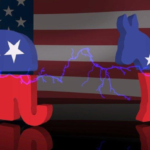
While our attention remains fixed on the harrowing tragedies in Gaza and Ukraine, another conflict is unfolding largely unnoticed in Southeast Asia. In Myanmar, more than four years of civil war have left four million people displaced and in desperate need of ever-decreasing aid. With elections fast approaching, this article aims to examine the roots of the crisis, the realities on the ground, and the appalling inaction of the international community.
What provoked the conflict?
On 1 February 2021, the Burmese military staged a coup against the democratically elected National League for Democracy (NLD) government, led by former Nobel Peace Prize winner Aung San Suu Kyi. The military claimed that the 2020 election results were fraudulent, driven by fear that the growing dominance of the NLD might jeopardise its long-standing influence in Burmese politics.
In response mass protests erupted across the capital, Naypyidaw, as civilians demanded the restoration of democratic rule. The junta responded with violent repression, resulting in more than 600 deaths and the arrest of Aung San Suu Kyi.
Who are the main actors involved in the conflict?
The key actors in the conflict include the military junta, led by Min Aung Hlaing, the de facto ruler of Myanmar, who has been accused of crimes against humanity by the International Court of Justice (ICJ), as well as numerous rival armed forces divided along ethnic lines. Notably, a coalition known as the Three Brotherhood Alliance launched a coordinated offensive in 2023, capturing more than 180 military outposts in the eastern state of Shan by the end of the year and posing a serious threat to the junta’s control.
The humanitarian situation
The UN currently classifies the conflict as ‘one of the world’s most underfunded humanitarian operations’, with only 12% of required aid financed by August, a shortfall likely to worsen following the recent decision by the Trump administration to cut foreign aid. The military has doubled down on its use of violence as a means of cementing power, with credible reports of torture, enforced disappearances, and other brutal methods used to silence dissent.
Particularly alarming is the situation of the Rohingya Muslim minority in Rakhine State. The military’s genocidal campaign in 2017 forced more than 700,000 Rohingya to flee across the border into Bangladesh. Ongoing fighting, worsened by hate-driven attacks by the Buddhist-majority militia, has displaced a further 150,000 since 2024.
What are the current developments
As the conflict approaches its fifth year, the junta plans to hold new elections in December and January in an effort to legitimise its rule. Several groups, including the Human Rights Watch, have already dismissed the elections as a ‘sham’, while the European Commission has ruled out sending observers, stating that the polls will be neither free nor fair. With the NLD banned by the junta from participating in the election, the military-backed Union Solidarity and Development Party (USDP) is expected to emerge victorious. Significantly, the military has intensified efforts to reclaim lost territory to ensure that elections can be held, using relentless airstrikes that have escalated violence.
This effort may be bolstered by last week’s ceasefire with the Ta’ang National Liberation Army, a member of the Three Brotherhood Alliance, which agreed to withdraw from several strategic towns along a major highway linking central Myanmar to China. Nevertheless, serious doubts remain about how the elections will be conducted, with UN Secretary-General Antonio Guterres warning that they could trigger further instability.
The reaction of the international community
While the title of this article may appear provocative, it perfectly captures the international community’s neglect, or indifference, towards this tragic conflict. Some of the silence could potentially be attributed to Myanmar’s long history of chaos. However, it would be naive to dismiss the crisis as merely a civil war, as a number of geopolitical interests are at stake.
Above all, China views the country as a strategic gateway to the Indian Ocean and as a vital route for oil and gas supplies to southwestern China. Unsurprisingly, Beijing has invested heavily in cultivating political parties whose participation, it believes, might make the oncoming election a genuine contest.
Equally worrying is the stance of the US. The Trump administration initially imposed sanctions on criminal networks and ethnic militias involved in junta-backed scam centres, human trafficking, and drug smuggling, only to partially lift those restrictions in July. There is growing suspicion that Washington may ultimately recognise the regime in exchange for access to Myanmar’s rare earth minerals, as it seeks to reduce its dependency on China.
Other major powers also appear to be sliding with the junta: Indian Prime Minister Narendra Modi has recently expressed support for the elections, while Russia remains the military’s primary arms supplier. The world may pretend Myanmar is too distant or too complex to care about, but ignoring it is a choice. And as authoritarianism ascends, we are watching a democracy burn in real time.
Edited by Elizabeth Pinkney
Image reference: CC BY-NC-ND 2.0



Average Rating